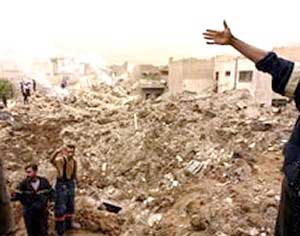
Buildings in the Mansour neighborhood
of Baghdad
lie in ruins after a U.S. warplane dropped
bombs
on the site. |
BAGHDAD, Iraq -- U.S.-led forces launched
a thundering assault Tuesday on symbolic and leadership targets in Baghdad,
raising more questions about the condition of Iraqi President Saddam Hussein,
his regime and military.
U.S. warplanes unleashed two satellite-guided
bombs on the ruling Baath party headquarters and Iraqi Information Ministry
on Tuesday afternoon, hours after targeting Special Republican Guard and
Republican Guard headquarters in the Iraqi capital, U.S. Army sources told
CNN.
These strikes came a day after a U.S. B-1
bomber dropped four 2,000-pound bombs on a building in a Baghdad residential
neighborhood suspected to contain Iraqi leaders, including Saddam and his
two sons. |
| Sources said the blast in the Mansour
neighborhood killed nine people, wounded 13 others and destroyed a restaurant
and apartments.
"I don't know whether he survived," President
Bush said Tuesday at a press conference with British Prime Minister Tony
Blair in Northern Ireland. "The only thing I know is that he's losing power.
... Saddam Hussein will be gone."
Coalition officials described a one-sided
war zone in Baghdad, with U.S. forces able to move at will through the
city and warplanes flying continuously overhead. |
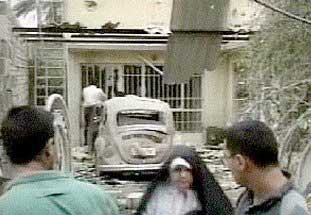
People walk past rubble after U.S. bombs
fell on a
building in the residential neighborhood
of Mansour.
|
| The coalition assault has left Iraq with
19 tanks out of its fleet of 800, a senior U.S. official said. The official
said that remnants of the Republican Guard continue to battle around Baghdad
but that they have no armored units and are no longer organized.
Early Tuesday, A-10 Warthog jets dropped
bombs at five- to eight-second intervals over Baghdad, dipping in and out
of low-cloud cover. The A-10s also strafed Iraqi positions with 30 mm cannons
in the center of the city, Atlanta Journal-Constitution reporter Ron Martz
told CNN. |
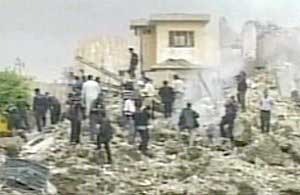
People walk in the ruins of Mansour after
U.S.
bombs fell on the residential neighborhood. |
| The action was similarly intense on the
ground as U.S. forces continued to advance and fortify their positions
deep inside the city.
In central Baghdad, flames shot from the
upper floors of a high-rise, Saddam's Ministry of Planning building, during
a firefight Tuesday morning between a U.S. armored unit and Iraqi forces,
Abu Dhabi TV reported. |
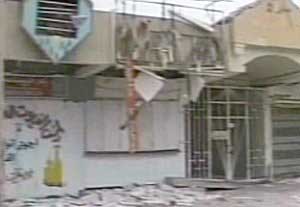
A building in Mansour was severely damaged
by
U.S. bombs, which the U.S. says were intended
for Iraqi leadership targets
|
| The conflict in Baghdad claimed the lives
of three journalists Tuesday. One Al-Jazeera reporter died in a U.S. airstrike
on a building housing Arab media, the Qatar-based TV network reported.
A Spanish TV cameraman and Reuters cameraman were killed and several other
journalists were wounded in an explosion at the Palestine Hotel, according
to Reuters and the Lebanese Broadcasting Corp.
U.S. military officials said U.S. forces
responded to sniper fire from various floors at the hotel. |
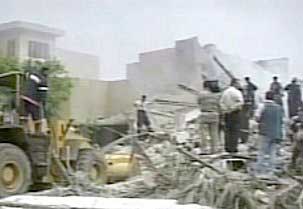
A bulldozer prepares to clean up the remains
of a building in Mansour.
|
| U.S. Marines continued their slow but
steady advance into southeastern Baghdad. The units, backed by close air
support, met sporadic Iraqi resistance at an industrial complex that included
a soft-drink bottling factory, brewery and cigarette factory, reported
CNN's Martin Savidge, who is embedded with the 1st Battalion, 7th Marines.
Marines also attacked and seized the Rasheed
military airfield in southeast Baghdad, Brig. Gen. Vincent Brooks said
at a U.S. Central Command briefing Tuesday. |
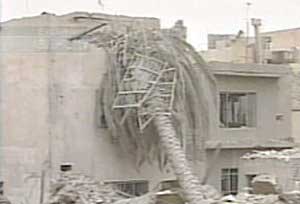
A palm tree lies against a building damaged
during the U.S. airstrike on the
Mansour neighborhood.
|
Other developments
• Members of the U.S. Army's 101st Airborne
Division, 3rd Brigade, engaged Fedayeen Saddam fighters in a fierce firefight
Tuesday for control of Hillah, a city about 50 miles south of Baghdad,
according to CNN's Ryan Chilcote, who is embedded with the unit.
• The Iraqi people -- not the coalition
or the United Nations -- will run the new Iraq, Blair insisted as he and
Bush were concluding talks in Belfast on post-war Iraq, the Middle East
and Northern Ireland. However, the United Nations should have a vital role
in Iraq's reconstruction, Blair said.
• Members of Jessica Lynch's family said
the former prisoner of war is in high spirits and in good medical condition
after visiting her at a U.S. medical facility in Germany. Lynch's family
said she is unaware of the media frenzy over her April 1 rescue. (Full
story)
• U.S. Marines in southeastern Baghdad
found scores of chemical suits, as well as masks and a box of atropine
injectors, that appeared to have been hastily abandoned Tuesday in a field
that coalition airstrikes targeted, CNN's Savidge reported.
A Russian convoy that came under fire over
the weekend may have deviated from its planned evacuation route, U.S. Army
V Corps senior commanders told the National Journal. U.S. military officials
said they understood the convoy would travel west on Highway 10 out of
Baghdad, but the group went farther north -- possibly into the thick of
a firefight. (Full story)
• The British military has begun efforts
to form an indigenous civil administration in Basra province with help
from a tribal leader. A local sheik who approached British officials will
form a committee to chart the future government of the southeastern Iraqi
region, Col. Chris Vernon said. (Full story)
• U.S. Special Forces are trying to seize
a strategic highway that links the northern Iraqi cities of Mosul and Kirkuk,
according to CNN's Ben Wedeman. The strategy is to cut off and isolate
the cities rather than going into them, Wedeman said. (Full story)
• The Iraqi National Congress, a group
that opposes Saddam's regime, said its forces have joined the military
campaign. A unit called the 1st Battalion Free Iraqi Forces, made up of
700 troops, began deployment near Nasiriya in the south, and the number
of forces in central and southern Iraq is expected to be increased.

|





